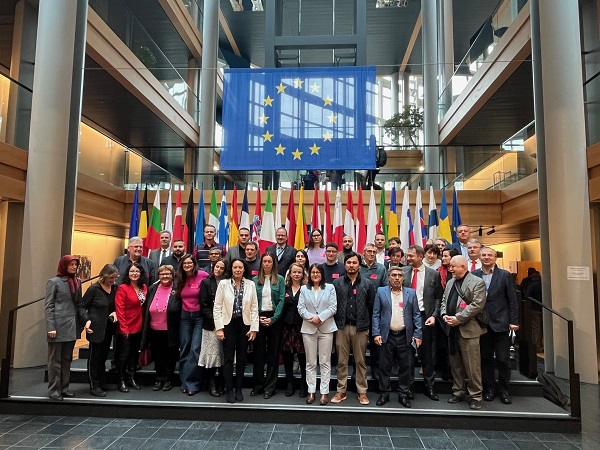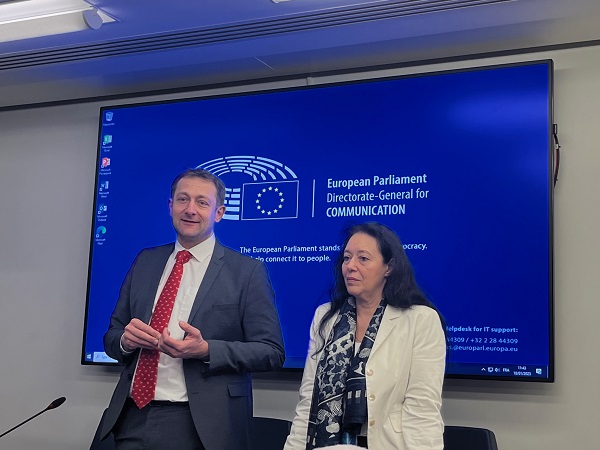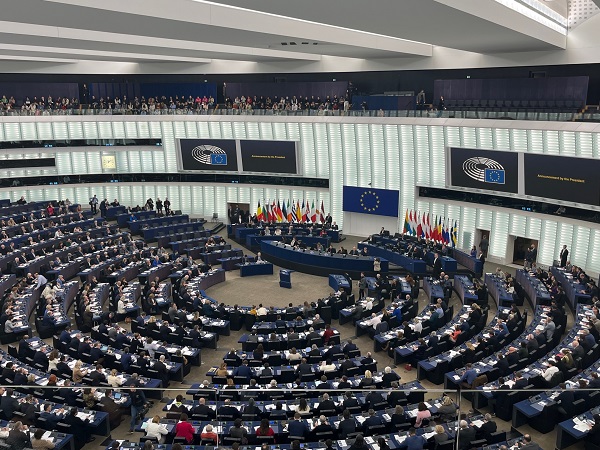 Credit: Chronicle.lu
Credit: Chronicle.lu
On Wednesday 18 January 2023, as part of the "Demystifying Politics" initiative, around 50 people from Luxembourg visited the European Parliament in Strasbourg, France.
The event had been organised by Clara Moraru, Deputy General Secretary of the CSV political party in the Grand Duchy, with the support of their two MEPs, Isabel Wiseler-Lima and Christophe Hansen (Luxembourg's other MEPs for 2019-2024 are: Charles Goerens (DP); Tilly Metz (Green); Nicolas Schmidt (LSAP; replaced by Marc Angel (LSAP)); Monica Semedo (independent; formerly DP)).
The group included individuals from a range of backgrounds, including Paul Schonenberg (AMCHAM Chairman) and Mariana Florea (The Network President), as well as representatives of the Iranian and Afghan communities in Luxembourg. They travelled by coach to the French city where the law-making body - and one of its three legislative arms - of the European Institutions is located. Weekly sessions are held monthly (twelve annually), with MEPs, their aides and other EP officials travelling to debate and vote on a vast range of issues spread across a myriad of topics.
Following a meet-and-greet with Luxembourg's two CSV MEPs, the group visited both the Hemicycle and the Parliamentarium before a lunch and the coach ride back to Luxembourg.
During the meeting with the two MEPs, they addressed the role and powers of the European Parliament (EP) and held a Q&A session with the members of the visiting group.
Isabel Wiseler-Lima explained that Christophe Hansen has specific interests in areas such as trade, finance and ecology, where her interests lie in human rights, fundamental rights and external relations / foreign policy. She talked about the importance of democracy and referenced Hungary which is "going in another direction". She mentioned human rights and gave the example of China which is trying to redefine what human rights are. She explained that it is good to be able to vote by qualified majority; however, there are some countries that do not accept decisions, e.g. sanctions against Russia. To become a power at the international level, she explained that individual countries would lose some individual power. In answer to a question from the group, she explained that the work of the EP covers both EU-internal and external issues.
On the workings of the EU, she explained that, for example in Luxembourg, the national parliament decides on the laws and it is the government whose job it is to implement those laws; at the level of the EU, the EP decides on new laws and it is up to Member States to transpose those laws into national legislation via their governments.
Christophe Hansen joined the discussion which was focussing on foreign relations, with Serbia "putting a brake" on support for Ukraine. He later joined the lunch and spent a lot of time talking with individuals and small groups.
The Hemicycle is where all MEPs sit during plenary sessions and where the most important European debates and votes take place. The group sat (in the public gallery) in on a vote on a new Vice-President of the EP (to replace Eva Kalli of Greece who had been ousted following a corruption scandal) for which Luxembourg's Marc Angel was one of three candidates. The secret vote took place electronically. The absolute majority would be 278; Marc Angel topped the first ballot with 263 votes; a second ballot was held in which Marc Angel again topped the vote, this time with 307 votes (out of a total of 645 votes).
Other votes were then taken on resolutions to do with consumer protection, foreign policy and other topics: they were processed rapidly, addressing the adoption of reports and amendments. The votes were initially undertaken by a quick show of hands; where the result was inconclusive / too close to call, an electronic vote was held (MEPs normally have around five seconds to vote electronically). One resolution proposed by Isabel Wiesler-Lima on human rights was adopted, including a number of amendments, some of which were adopted and others rejected.
The Parliamentarium lays out the process behind making law for the whole of the European Union and explains what the MEPs are doing to meet the challenges of today.
Talking with Chronicle.lu, Clara Moraru stated: "The group was very diverse and included members of CSV International [CSV's organisation dedicated to the international community] and representatives of different associations and professional chambers from Luxembourg, e.g. The Network, AMCHAM, the British Chamber of Commerce, Finland Chamber of Commerce, the Ireland Luxembourg Chamber of Commerce, the Irish Club of Luxembourg, the Afghan Association of Luxembourg, Indians in Luxembourg, the Association Luxembourg-Roumanie and the American Women's Club."
She explained: "This event is part of my #LetsDemystifyPolitics campaign that I started in 2017 within CSV. It aims at building a bridge between members of the international community and local, national and European politicians, facilitating their contact and allowing them to exchange views and opinions and, hopefully, to increase their political participation."










